Guppies aren’t very long-lived compared to some other aquarium fish, but there are a range of factors that influence how long they can live. After all, you want to get the most out of your pets!
Guppies live 1-3 years, although they can live upwards of 5 years in the right conditions. Water parameters, tankmates, tank environment, and species all play a role in how long your guppy will live.
When it comes to community or nano tanks, guppies are a highly recommended pick. They’re easy to care for and can live a long, happy life.
Keep reading, because I’m going to share some helpful information about how long guppies live and how you can help them live longer!

Table of Contents
Guppy Lifespan
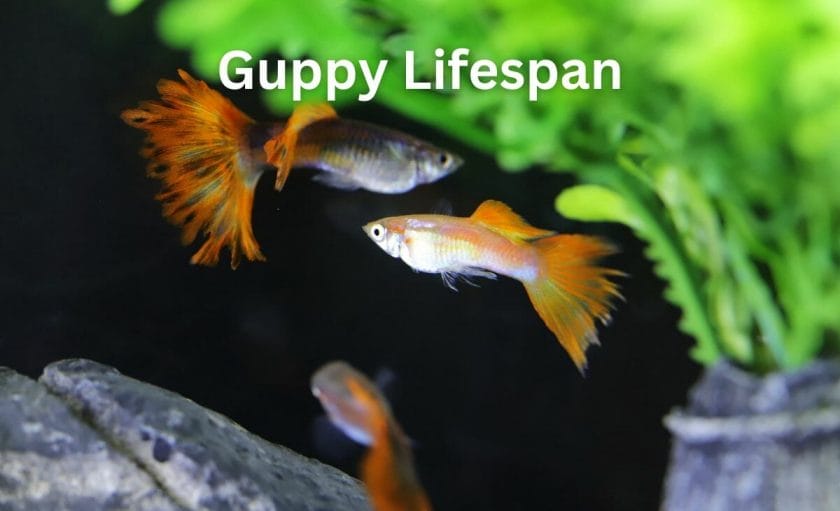
The total lifespan of guppies varies greatly, but you can generally expect them to live for upwards of 2 years. As with most fish, longevity is determined by a range of factors, some you can control and a few you can’t.
Genetics can impact a guppy’s lifespan, but generally, guppies living in a more suitable tank environment are dispositioned for a longer, happier life. By contrast, those subjected to poor tank conditions will be stressed and more prone to disease.
Guppy Life Stages
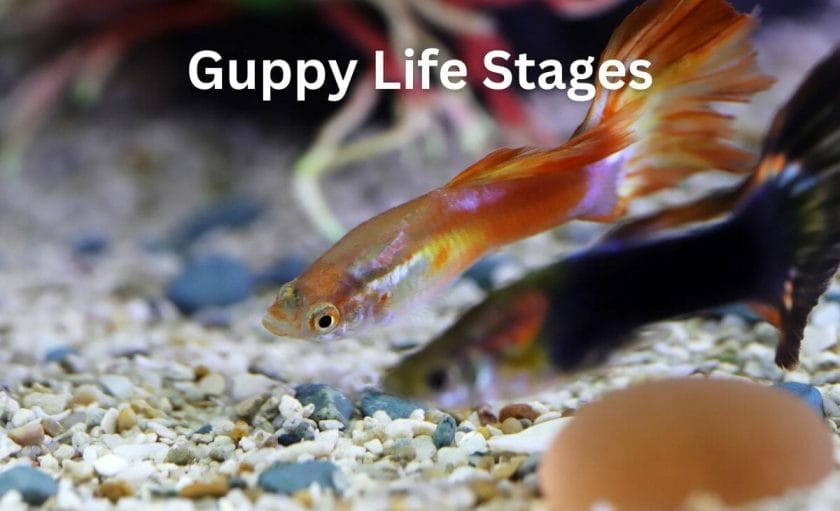
Guppies go through different life stages, which can help you determine their age and remaining lifespan. The age of a guppy is correlated to their size. The species also exhibits significant sexual dimorphism in that the females tend to be bigger than the males, and the males are easily distinguished by their bright colors.
Here’s a quick chart to help you determine how old your guppy currently is based on their size.
| Age | Size |
| 1 month | ¼ inch |
| 2 months | ½ – ⅔ inches |
| 6 months+ | 1.5 – 2.5 inches |
The life cycle of a guppy is broken down into four distinct stages.
Fry
Female guppies start producing offspring at 10-20 weeks of age and will continue to reproduce until they are 3 years of age. There’s almost a certainty that you will see guppy fry in your tank, as guppies are prolific breeders.
The females will mate with multiple males, particularly those that are the brightest and fittest. When the fry spawn, they are at their most vulnerable. If you want to be technical, there is an ‘egg’ stage wherein the guppies are retained inside the mother until they are fully developed, a survival method known as livebearing.
This gestation period lasts for 3-4 weeks, during which the female will show clear signs of pregnancy in the rounding of the belly. They can give birth to anything from 5-100 babies.
As such, the first you’ll know of new guppies in your tank are tiny little specks.
The guppies don’t receive any parental care when they spawn; in fact, their parents will eat them if given the chance, as will other fish. Their chances of survival are largely dependent on the quality of the water they are in.
Guppies are fully developed when they are born, but they are still highly susceptible to predation at just a quarter inch in size after the first 30 days. It’s most definitely a fish eat fish world out there when it comes to guppies.
Juvenile
At the 30-60 day mark, guppies start transitioning rapidly, evidencing colors and patterns on their body. During this stage, a guppy can start eating larger chunks of food and will begin to develop characteristics of either a male or female.
It’s recommended to water change daily, as juvenile guppies grow very quickly, thereby producing a ton of ammonia as a waste product.
Adult
Between 2-4 months of age, guppies will be fully grown and have almost all of their coloration. They will be very easily distinguished as male or female. At this time, males begin to vie for dominance in a tank.
As long as you have enough guppies, aggression is spread evenly throughout the group, so you don’t generally have to worry about bullying, but more on that later.
They will reach sexual maturity at 4-6 months of age, maxing out at 1.5 inches to 2.5 inches, again depending on their sex. During this time in their lifecycle, guppies will begin reproducing prolifically. Remember, females can lay eggs every 4-6 weeks and spawn up to 100 fry per birth, so if you don’t want an explosion in population, it’s best to remove visibly pregnant females and raise the fry separately to avoid overstocking a single tank
Senior
Eventually, a guppy will stop breeding and will remain the same size for the remainder of its life. Generally, a senior guppy’s nutritional needs don’t change, and you don’t need to provide any additional care for them.
Depending on the conditions of the tank, they can leave an additional year or two after reaching the senior stage of life.
What Factors Impact Guppy Lifespan?

Stocking
The number of fish in a tank can impact guppy’s lifespan. Too many, and the water parameters will be askew, increasing the risk of disease and other health complications. As a general rule, keep your tank stocked according to the 1 fish per inch of tank space. Doing so can help you avoid overstressing your filter.
That’s true whether you’re putting guppies in a community tank with other species or if you’ve got a tank overrun with guppy fry. As we mentioned, guppies grow very rapidly after birth, a process that produces a lot of waste.
That’s why it’s important to make sure you’ve got the proper sized filter for the job (and make sure your tank is cycled fully before introducing fish!); moreover, you’ll want to regularly test your tank for signs of overstocking.
Too many fish can produce too much ammonia for the beneficial bacteria in your filter to keep up with. As such, excess ammonia remains in the tank, causing harm to your fish. A test kit can help you keep tank conditions under wraps. I recommend this API Master Test Kit. It can help you test for ammonia, nitrites, and nitrates.
For reference, ammonia and nitrites should be at 0 ppm, and nitrates should be under 40 ppm. Any higher, and it’s time for a water change.
Other Tankmates
Guppies are susceptible to predation, which shouldn’t surprise you. They’re small, relatively slow-moving, and make an easy meal for any fish that can fit them in their mouth. Here’s a handy list of tank mates that won’t harm your guppies:
- Mollies
- Platies
- Tetras
- Cories
- Danios
- Rasboras
- Swordtails
- Otocinclus
- Bristlenose Plecos
- Other guppies
- Snails
- Shrimp
- Kuhli Loaches
By contrast, the following are some tankmates you’ll want to avoid:
- Tiger barbs
- Cichlids
- Oscars
- Goldfish
- Killifish
Pretty much, if a fish can fit another fish in its mouth, it will probably eat it given the chance. As such, you’ll want to carefully consider how big your tankmates are going to get and factor that into your decision.
Filtration
We touched on filtration briefly in the section on overstocking, but it’s important that you provide adequate filtration for any fish. Guppies in particular are well suited to a range of tank conditions and are pretty hardy; still, that’s not an excuse to give them poor water quality, and it will negatively affect their lifespan.
Filtration helps to remove ammonia-producing detritus and leftover food. It also helps to remove a toxic buildup of ammonia and nitrates through a process called the nitrogen cycle. A filter should be cycled for 4-6 weeks and tested regularly. You know your tank is cycled when you have 0 ppm ammonia, 0 ppm nitrite, and some nitrate.
If your filter is the right size and you dilute your water by 30-50% regularly (weekly or biweekly, depending on the size of your tank), your guppies will live longer.
Water Parameters
Water parameters are important to understand for guppies. While they can thrive in a range of conditions, they still have their limits and preferred conditions to live in.
Understanding the ideal water parameters as it pertain to filtration and chemical balance is important for any tank environment and is the mark of a seasoned aquarist.
Here’s a quick breakdown of the water parameters guppies need.
| Ammonia | 0 ppm |
| Nitrite | 0 ppm |
| Nitrate | Under 40 ppm (dilute when needed) |
| Temperature | 72- 84 F |
| pH | 6.8-7.6 |
| Water Hardness | 8-12 dGH |
| Minimum Tank Size | 10 Gallons |
Keep your tank within these parameters, and your guppies will be better positioned to live a longer life.
Stress
Broadly speaking, a stressful environment can reduce the lifespan of guppies. This is especially true if they’re being bullied, are in poor-quality water, or have nowhere to hide. As we’ve mentioned, predators can pick on or even eat guppies, which is why it’s important to be careful what tankmates you pick.
Being constantly bullied is no way to live and can cause stress to fish. Increased levels of stress in guppies can increase their susceptibility to disease by compromising their immune systems. The same is true when guppies are exposed to poor water conditions.
High levels of ammonia can burn the fins and gills of guppies, causing discomfort and stress. Bad tank conditions can also lead to algae blooms, lower oxygen levels, poor water aeration, and increased risk of developing disease, all of which can negatively impact your fish’s health, in addition to causing them stress.
Signs of stress include the following:
- Lethargy
- Lack of appetite
- Loss of color
- Gasping
- Fin nipping
Genetic Factors
Genetic deformities and other factors can impact how long a guppy lives. You won’t necessarily know a guppy has a deformity or a predisposition toward certain diseases, so in most cases, genes are just a luck of the draw.
It’s important to provide high-level care for your fish, as certain genetic factors can be influenced by the quality of your tank.
On this topic, where you purchase your guppies is important. Buying guppies from a reputable breeder is preferable to buying them from a pet shop.
First, by purchasing from a breeder, you’re supporting an industry that cares about the quality and health of the fish they sell as opposed to a corporate entity that may be more apathetic.
Breeder-bought guppies are usually fed a tailored diet, kept in ideal tank conditions, and carefully selected for breeding. As such, you can usually expect more vibrant coloring and healthier fish.
That’s not always true, however, since no one can ultimately predict how a strain of guppies will turn out. Above all, you should be wary of scams from sellers online who are offering deals that are too good to be true. The best practice is to purchase locally from reputable breeders.
Disease
Diseases, both preventable and unpreventable, can impact a guppy’s lifespan. Keep a close eye on your tank for signs of diseases, including the following:
- Ich – Commonly called white spots, these parasites latch on and form cysts on fish, eventually dropping to reproduce thousands of new free-swimming parasites.
- Dropsy – A swelling of the abdomen caused by viral or bacterial infections.
- Fin rot – Caused by extreme fin nipping due to stress, leading to invitations for other diseases and illnesses.
- Pop-eye – Swelling of the eyes caused by a range of origin factors.
As mentioned, some of these diseases are a direct result of poor tank maintenance; others, you can only do your best to detect and treat early. That’s why it’s good to educate yourself on different fish diseases because early detection is the key to a quick recovery!
I recommend having aquarium salt on hand, as it’s a good starter treatment for many different diseases. I recommend API as a well-priced and trustworthy brand. Aquarium salt adds essential electrolytes into the tank and aids in fish respiration, which can help them recover from some diseases.
Be mindful, of course, that aquarium salt is not a cure-all, and you will need to carefully do your research to determine the cause of the disease and make changes accordingly.
Tips to Keep Your Guppies Healthy
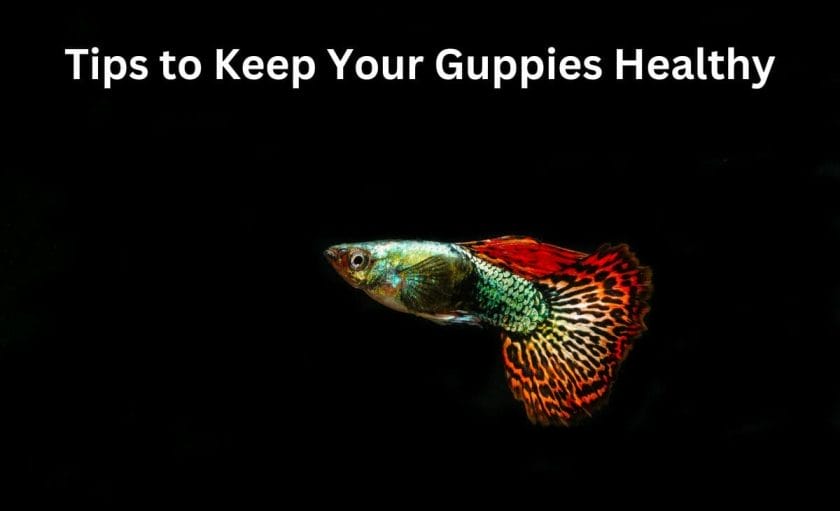
A number of factors contribute to overall guppy health, and with the right care, they can live for 3 years or more!
Diet
Feeding a varied diet helps guppies live longer. Guppies need a different diet depending on their age, which is why we recommend separating the fry so that you can tend to their needs as they age.
Younger guppies, for example, will need more food and can be fed 3-5 times per day. Adults, on the other hand, only need feeding once or twice per day. In either case, protein is the most important factor to consider. Quality, high-protein sources of food are essential for guppy health.
Flakes and pellets designed for tropical fish are ideal since they provide well-rounded nutrition and are easy for your guppies to digest. Follow the instructions on the label to make sure you’re feeding the guppies the right amount.
It’s better to underfeed than to overfeed, since the #1 problem in new aquariums is overfeeding.
As such, if your fish are demonstrating any of the following symptoms, it’s time to start reducing the amount you feed:
- Lethargy
- Bloating
- Constipation
- Loss of appetite
- Swim bladder issues
Generally, you’ll be able to tell your fish are bloated by their appearance. Some bloating is normal, but your fish shouldn’t have any trouble passing stool and shouldn’t wind up upside down. If they do, it’s a warning sign that they’ve eaten too much and pressure is being exerted on the swim bladder.
What Human Food Can Guppies Eat? (Answered)
Environment
The right environment can help your guppies live longer, largely by helping alleviate stress. A natural, rich environment with plants and hardscaping makes the guppies feel more at home. Avoid sharp decorations, as guppies aren’t strong swimmers and may injure themselves.
Sand is an ideal substrate for a guppy since it’s fine and soft. Gravel is ok, but you should ideally avoid crushed coral or other harsher substrates.
Another factor in the environment that can help your guppies live longer is plants. Not only do plants help aerate the tank and compete with algae for carbon dioxide, but they also provide places for fish to rest.
This is important particularly for female guppies, who are often being chased by males. Giving them respite can greatly reduce stress. The same is true for guppies in a community setting.
Even if you pick the right tankmates, aggression among fish isn’t uncommon, which is why it’s nice to provide plants and hardscaping that allow them to take a break from one another.
Some great beginner plants I recommend include the following:
- Amazon Sword
- Anubias
- Java Moss
- Crypt Wendtii
These are all easy to care for, look great in a tank environment, and provide numerous benefits for your tank. In general, plants are a great way to improve any aquarium ecosystem.
Water Parameters
It’s paramount to keep your guppies within the parameters mentioned in the helpful chart above, so be sure to refer to that as needed.
To do so, you’ll need to have a heater. Most heaters you can buy come with a thermostat that you can freely adjust, but I recommend this Via Aqua Quartz Heater.
You will also need to have a filter that’s already cycled. Otherwise, it won’t be able to keep up with the waste your fish are producing. Lastly, you’ll need to dilute the water every now and again to keep the nitrates under 40 ppm. To do so, you can siphon out the water and replace it with conditioned tap water.
It’s crucial to treat your water before adding it to the tank. A dechlorinator can help remove harmful chlorine and chloramine, as well as detoxifying ammonia and nitrite in tap water. I recommend Seachem Prime, as it’s a reputable brand that’s worked well for me in the past.
Proper Tank Size
The more fish you have in a smaller tank, the more waste will be produced. That waste prompts the growth of ammonia, which harms your fish.
It’s best to keep your guppies in a 10-gallon tank or larger. 10 gallons provides enough room for them to grow and allows territorial disputes to be settled over a larger area.
If you’re keeping other community fish with your guppies, then a 20 gallon tank is your best bet. That way, you can rest assured that your tank isn’t overstocked.
As a bonus tip, it’s important to not only determine your tank size, but also its location. Keep it away from sunlight, as sunlight can create ideal conditions for algae to bloom. Carefully consider a location in your home that fits the bill.
Socialization
Guppies prefer to be kept in groups of 5 or more for proper socialization. This helps alleviate aggression, as the males will fight with one another and will chase the females.
Having a 3:1 female-to-male ratio is ideal, since it reduces infighting with the males and gives each individual female some respite. They will also happily school and socialize with other species of fish, too, which is why they’re a great pick for a community tank.
Do Guppies Live Longer in Captivity or in the Wild?
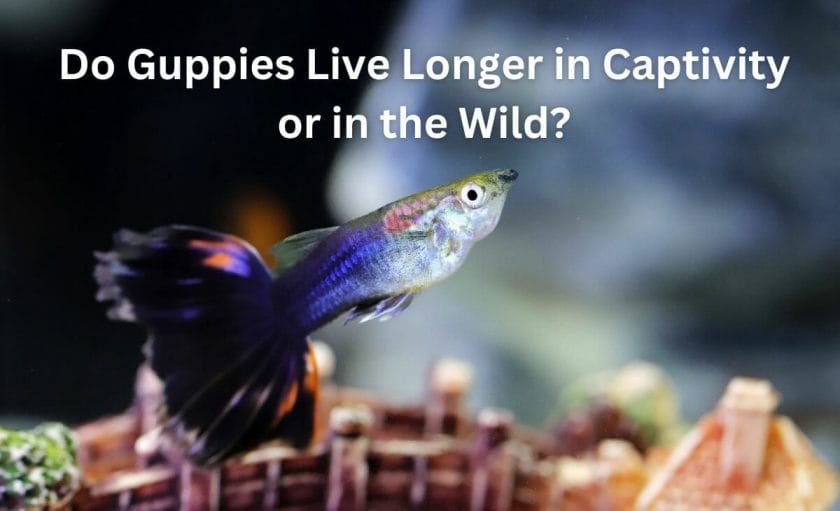
Guppies generally live longer in captivity. Their lifespan in the wild is 2 years, much like that of a tank-kept guppy, but predation from birds and other fish may shorten their lifespan in the wild. It’s fair to say that guppies in the tank have it easier, and on paper, it’s easier to keep a tank-kept guppy healthy since you have full control over the water parameters.
Still, guppies born in the wild might be more resistant to changes in water temperature and pH, while guppies in tanks may not.
FAQs
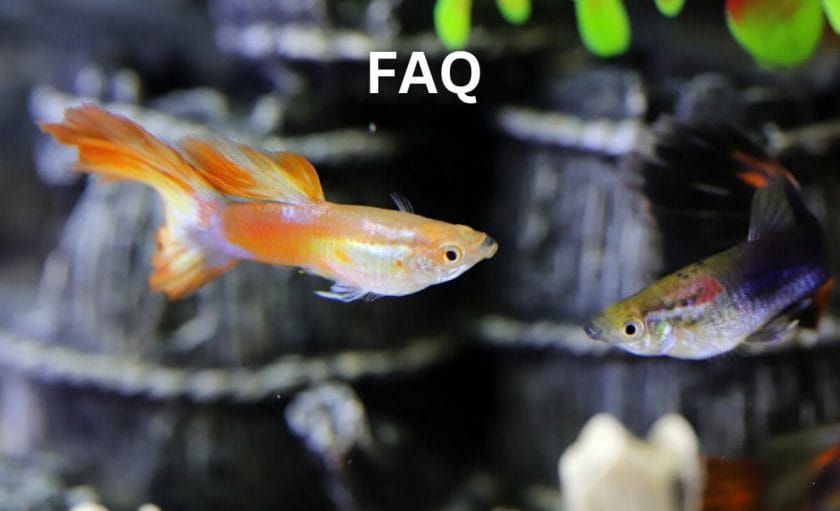
Can Overfeeding a Guppy Shorten Their Lifespan?
Overfeeding can absolutely shorten the lifespan of a guppy. Excess food on the bottom of the tank prompts the growth of algae and harmful bacteria that produce ammonia. Refer to the instructions on the fish food you’ve purchased for the recommended dosage.
Can Guppies Live in a Bowl?
Guppies, or any other fish, should not be kept in a bowl, as it will dramatically shorten their lifespan. The lack of filtration and space will cause increased stress for your guppies.
Conclusion
Guppies are a great fish to add to many tanks because they are easy to care for and are compatible with many other fish species. Still, there are a number of active steps you can take to increase their lifespan.
Make sure to refer to the helpful information I’ve provided above so that you can help your guppies live their best life!
Besides that, here are 11 things you can do to keep your guppies happy and healthy.